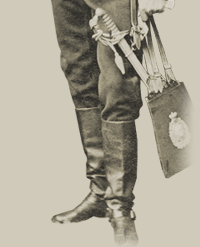

 |
|
GlossaryGlossaries have been created to provide the definition for words specific to each theme area. It is suggested that students review the glossaries before they examine a specific theme area. For example, the Ranching Glossary contains many terms such as "greenhorn," "heifer," or "wrangler," that only a rancher or cowboy might know. Agrarian: Relating to the land and its ownership, cultivation, or agricultural interests. Auxiliary line: A subsidiary or supplementary rail line, meaning it is not the main rail line. Canadian Pacific Railway (CPR): The CPR was formed to unite Canada from coast to coast. The groundbreaking ceremony near Fort William (now Thunder Bay) on June 1, 1875, signaled the beginning of its construction. The "Last Spike" of the main line was driven in on November 7, 1885. Cholera: An infectious disease of the small intestine characterized by profuse watery diarrhea, vomiting, muscle cramps, severe dehydration, and depletion of electrolytes. Confectionary: A shop that sells thing like candy. Czar: One of the male monarchs or emperors who ruled Russia until the revolution of 1917. Department of the Interior: The department of the Canadian federal government that was charged with dealing with the internal affairs of Canada. Its responsibilities included immigration, conservation, and development of natural resources. Dirty Thirties: Term referring to the Great Depression in Canada from 1929 until 1939. Western Canada's economy had massive unemployment, breadlines, relief camps, protest marches, and dust storms. The beginning of the Second World War in 1939 brought Canada out of the Great Depression. Dominion: A self-governing nation within the British Commonwealth. Drought: A long period of unusually low rainfall that adversely affects growing and living conditions. Emigration: To leave one country to move to and settle in another. Foot Binding: A painful process where Chinese women wrapped a bandage tightly around their feet, forcing the four small toes under the sole of the foot. This made the feet narrower and shorter and bowed the arch of the foot. It was done because it was thought to be beautiful. Freight: Goods carried or transported by a commercial vessel or vehicle. Geology: The scientific study of the origin, history, and structure of the earth. Hot Springs: Groundwater seeps into a mountain and flows deep into the earth's interior. It is heated, pressurized, loaded with minerals and percolates back to the surface, emerging in several spring outlets. Immigrant: A person who leaves one country to settle permanently in another. Immigration: To enter and settle in a country that a person was not born in. Irrigation: To artificially supply dry land with water by means of manmade ditches, pipes, or streams. Knighthood: The act of taking on a nonhereditary title conferred by a king or queen in recognition of personal merit or service to their country. (e.g. Sir William Van Horne) Main line: The major or principal rail line of a railway company. Maverick: There are two main definitions.
National Park: An area of land declared public property by a national government in order to preserve and develop it for purposes of recreation and culture. Navvies: The men who actually built the railways. The word is derived from the word "navigator." Pioneer: A person or family that ventures into unknown territory to settle. Rail car: A wheeled trailer adapted to the rails of railroad and pulled by a railway engine. Railway: The commercial organization responsible for operating a railway system Rheumatism: A condition of the muscles, tendons, joints, bones, or nerves, characterized by discomfort and disability. Superintendent: A person who has the authority to supervise or direct. Surveyor: A person who determines the boundaries and elevations of land and features such as lakes, rivers, and mountains. Telegraphy: Communicating over a long distance by using electric impulses through wire and Morse code. |
![]()
Mavericks Home
| Student Resources Home |
Teacher Resources
Contact
| Site Map | Credits
© Copyright Glenbow Museum, 2006. All Rights Reserved
